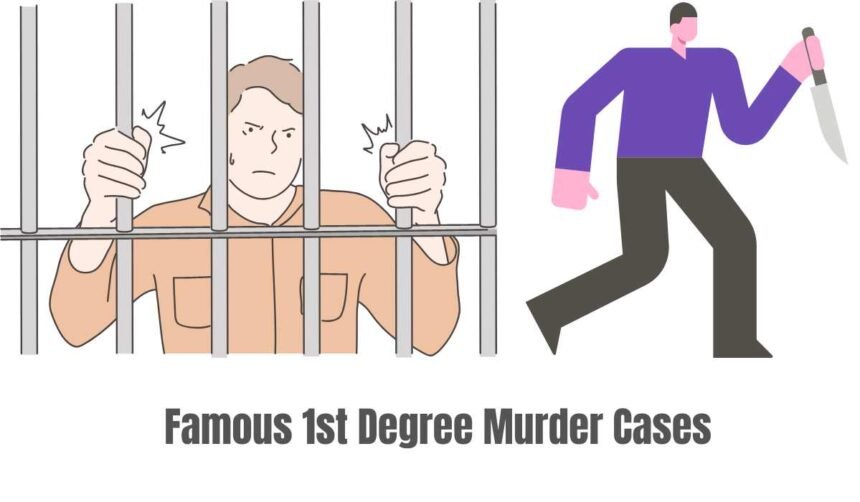It’s no secret that murder mysteries, especially those involving prominent figures, have always fascinated the public.
The detailed details, murky motivations, and heated courtroom battles surrounding these cases never fail to capture the public’s attention.
This article examines the contexts, evidence, trials, and societal effects of three high-profile first-degree murder cases.
9 Famous 1st Degree Murder Cases
Case 1: The O.J. Simpson Trial
One of the most well-known cases in recent legal history is O.J. Simpson’s trial for the murders of his ex-wife Nicole Brown Simpson and her friend Ron Goldman.
It was a perfect storm of intrigue, set against the backdrop of fame, racial tensions, and a media frenzy. The prosecution attempted to highlight Simpson’s history of domestic violence by arguing that he planned and carried out the murders deliberately.
However, the defense raised reasonable doubt by suggesting that evidence may have been mishandled or tainted in the lab. Simpson’s attempt to put on a glove found at the site of the crime became a defining moment in the case.
After Simpson’s acquittal in 1995, many Americans were angry and skeptical of the justice system.
Case 2: The Scott Peterson Case
The case of missing Modesto, California, pregnant mother Laci Peterson in 2002 became a riveting mystery. As the evidence against Laci’s husband, Scott Peterson, grew, so did the media’s interest.
According to the prosecution, Peterson was a cold-blooded criminal who killed his wife and unborn child so he could get away from his obligations as a husband and begin a new life with his girlfriend.
They showed proof of Peterson’s extramarital affairs, money problems, and erratic conduct. The defense claimed that Peterson was singled out unfairly and offered up the possibility that Laci had been abducted by strangers.
Peterson was convicted of 1st degree murder in 2004 and sentenced to death, despite a lack of hard physical evidence connecting him to the murders.
Case 3: The Amanda Knox Trial
Amanda Knox, an American student, and Meredith Kercher’s roommate gained worldwide notice when she was implicated in the 2007 murder of Kercher, a British student in Perugia, Italy.
Knox and her ex-boyfriend Raffaele Sollecito were accused of murdering their victim after a drug-fueled sex game went awry. DNA evidence, inconsistent alibi statements, and Knox’s supposedly inappropriate behavior after the crime were all offered as proof against him.
The defense claimed the evidence was faulty and that officers forced Knox into making false statements. Knox and Sollecito were initially found guilty in 2009, but after multiple trials and appeals, they were finally exonerated in 2015.
Also See: Find Top Rated Criminal Defense Attorney in Your City
Case 4: The JonBenét Ramsey Case
The 1996 murder of JonBenét Ramsey, age 6, who was competing in a beauty pageant, sent shockwaves throughout the country. Her body was discovered in the Boulder, Colorado, basement of the family home.
Numerous conspiracy theories, from family participation to intruders, surfaced in response to the case’s widespread media coverage. The initial probe received negative feedback due to bungled evidence handling and leaks to the press.
To this day, there have been no arrests or convictions in the case, leaving behind a legacy of unanswered questions and widespread intrigue.
Case 5: The Manson Family Murders
Charles Manson and his cult members, who became known as the Manson Family, committed a string of horrific acts in the late 1960s. Sharon Tate, an actress, and several others were killed in their Los Angeles residences in August of 1969.
Manson’s ambition to create a racial war inspired his twisted ideology and the blind loyalty of his followers, who carried out the killings without hesitation.
The public’s attention was brought to the hazardous dynamics of cult behavior and the horrible repercussions of blind devotion after Manson and several of his followers were convicted of 1st degree murder.
Case 6: The Menendez Brothers
In 1989, the country was rocked by the news of the brutal killings of Jose and Kitty Menendez at their Beverly Hills mansion. Lyle and Erik Menendez were initially portrayed as heartbroken sons unraveling under the weight of a tragic childhood. However, a shocking discovery soon followed.
As details surfaced, it became clear that the brothers had murdered their parents with great precision, motivated by a fight over the family fortune. Their lawyers claimed that their clients’ years of torture led directly to them killing someone.
Both brothers were found guilty of 1st degree murder in 1996, demonstrating that there is often more to a crime than meets the eye.
Case 7: The Casey Anthony Trial
Caylee Anthony, then two years old, vanished in 2008, and the trial of her mother, Casey Anthony, captivated the nation. Casey was accused of killing her daughter on purpose so she could get her life back and go back to partying.
The defense argued that Caylee drowned in the family pool by accident and that Casey’s actions afterward were a result of his reaction to this traumatic event.
Public outcry and arguments over the limits of forensic evidence and circumstantial reasoning ensued after Casey was acquitted of 1st degree murder in 2011.
Case 8: The Jodi Arias Trial
Graphic evidence and explicit descriptions of the stormy relationship between Jodi Arias and Travis Alexander were hallmarks of her 2013 trial for murder.
After originally denying any participation, Arias changed her story and said she killed Alexander in self-defense during a scuffle. Due in large part to Arias’s testimony and the explicit evidence presented, the trial became a media sensation.
In the end, Arias was found guilty of 1st degree murder in 2013; his case provided insight into the complexities of violent relationships and the difficulties of determining a witness’s credibility.
Case 9: The Boston Marathon Bombing Trial
Three people were murdered and hundreds were injured in the 2013 Boston Marathon bombing, which prompted one of the most publicized federal trials in recent memory. Among the 30 charges leveled against one of the two suspects, Dzhokhar Tsarnaev, 17 carried the death penalty.
The prosecution provided evidence of Tsarnaev’s participation in the planning and execution of the attack, while the defense contended that the defendant had been influenced and coerced by his elder brother, Tamerlan Tsarnaev.
Tsarnaev’s 2015 conviction and death sentence on many crimes, including 1st degree murder, sparked discussions regarding whether or not the death penalty has any place in today’s legal system.
Common Themes and Patterns
Several common threads and trends in high-profile murder trials have been brought to light by these cases. To begin, the importance of the media is paramount. The media’s coverage of the O.J. Simpson trial was unprecedented at the time and had a significant impact on public perception.
The media’s constant vigilance in the Scott Peterson, Amanda Knox, and JonBenét Ramsey cases similarly influenced the stories told and frequently fed rumors and speculation.
Forensic evidence, witness statements, and legal tactics all play crucial roles as well. The outcome of each case was significantly affected by how the evidence was presented and interpreted.
Finally, these stories demonstrate how the justice system is inherently complex, with conflicting narratives, biases, and legal technicalities all contributing to divergent views of guilt or innocence.
Lessons Learned
Criminal psychology, police methods, and the judicial system can all be better understood through a close examination of these cases. Celebrity, race, and public perception all play a role in the legal system, as was demonstrated by the O.J. Simpson trial.
Even in the lack of direct proof, as in the Scott Peterson case, it is crucial to create a strong circumstantial case. The Amanda Knox trial shows what may happen when investigations are rushed and conclusions are drawn hastily.
The murder case of JonBenét Ramsey illustrates the difficulties associated with investigating and prosecuting high-profile crimes involving the deaths of young children.



